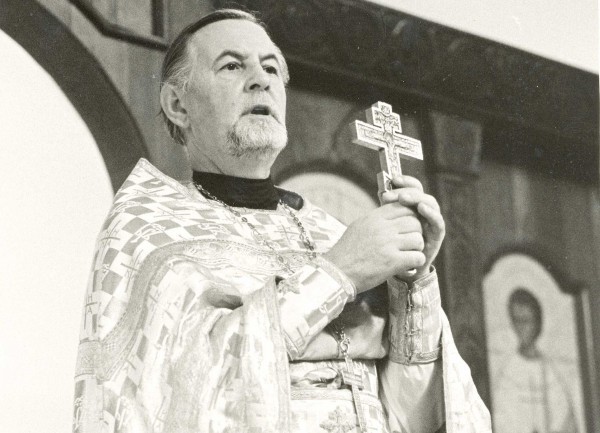As once more we are about to enter the Great Lent, I would like to remind us – myself first of all, and all of you my fathers, brothers, and sisters – of the verse that we just sang, one of the stichera, and that verse says:“Let us begin Lent, the Fast, with joy.”
Only yesterday we were commemorating Adam crying, lamenting at the gates of Paradise, and now every second line of the Triodion and the liturgical books of Great Lent will speak of repentance, acknowledging what dark and helpless lives we live, in which we sometimes are immersed. And yet, no one will prove to me that the general tonality of Great Lent is not that of a tremendous joy! Not what we call “joy” in this world – not just something entertaining, interesting, or amusing – but the deepest definition of joy, that joy of which Christ says: “no one will take away from you” (Jn. 16:22). Why joy? What is that joy?
So many people under various influences have come to think of Lent as a kind of self–inflicted inconvenience. Very often in Lent we hear these conversations: “What do you give up for Lent?” – it goes from candy to, I don’t know what. There is the idea that if we suffer enough, if we feel the hunger enough, if we try by all kinds of strong or light ascetical tools, mainly to “suffer” and be “tortured,” so to speak, it would help us to “pay” for our absolution. But this is not our Orthodox faith. Lent is not a punishment. Lent is not a kind of painful medicine that helps only inasmuch as it is painful.
LENT IS A GIFT! Lent is a gift from God to us, a gift which is admirable, marvelous, one that we desire. Now a gift of what? I would say that it is a gift of the essential – that which is essential and yet which suffers most in our life because we are living lives of confusion and fragmentation, lives which constantly conceal from us the eternal, the glorious, the divine meaning of life and take away from us that which should “push” and, thus, correct and fill our life with joy. And this essential is thanksgiving: the acceptance from God of that wonderful life, as St. Peter says, “…created out of nothing…,”created exclusively by the love of God, for there is no other reason for us to exist; loved by Him even before we were born, we were taken into His marvelous light. Now we live and we forget. When was the last time I thought about it? But I do not forget so many little things and affairs that transform my whole life into empty noise, into a kind of traveling without knowing where.
Lent returns to me, gives back to me, this essential – the essential layer of life. Essential because it is coming from God; essential because it is revealing God. The essential time, because time again is a great, great area of sin. Because time is the time of what? Of priorities. And how often our priorities are not at all as they should be. Yet in Lent, waiting, listening, singing … you will see, little by little that time – broken, deviated, taking us to death and nowhere else, without any meaning. You will see that time again becomes expectation, becomes something precious. You wouldn’t take one minute of it away from its purpose of pleasing God, of accepting from Him His life and returning that life to Him together with our gratitude, our wisdom, our joy, our fulfillment.
After this essential time comes the essential relationship that we have with everything in the world, a relationship which is expressed so well in our liturgical texts by the word reverence. So often, everything becomes for us an object of “utilizing,” something which is “for grabs,” something which “belongs” to me and to which I have a “right.” Everything should be as Communion in my hands. This is the reverence of which I speak. It is the discovery that God, as Pasternak once said, was “…a great God of details,” and that nothing in this world is outside of that divine reverence. God is reverent, but we so often are not.
So, we have the essential time, the essential relationship with matter filled with reverence, and last, but not least, the rediscovery of the essential link among ourselves: the rediscovery that we belong to each other, the rediscovery, that no one has entered my life or your life without the will of God. And with that rediscovery, there is everywhere an appeal, an offering to do something for God: to help, to comfort, to transform, to take with you, with each one of you, that brother and sister of Christ. This is that essential relationship.
Essential time, essential matter, essential thought: all that is so different from what the world offers us. In the world everything is accidental. If you don’t know how to “kill” time, our society is absolutely ingenious in helping you to do that. We kill time, we kill reverence, we transform communications, relationships, words, divine words into jokes and blasphemies, and sometimes just pure nonsense. There is this thirst and hunger for nothing, but external success.
Don’t we understand, don’t we understand, brothers and sisters what power is given to us in the form of Lent. Lenten Spring! Lenten beginning! Lenten resurrection! And all this is given to us free. Come, listen to that prayer. Make it yours! Don’t even try to think on your own; just join, just enter and rejoice! And that joy will start killing those old and painful and boring sins… And with that you will have that great joy which the angels heard, which the disciples experienced when they returned to Jerusalem after Christ’s Ascension. It is that joy which was left with them that we nobly adopted. It is first of all the joy of knowing, the joy of having something in me which, whether I want it or not, will start transforming life in me and around me.
This last essential is the essential return to each other: this is where we begin tonight. This is what we are doing right now. For if we would think of the real sins we have committed, we would say that one of the most important is exactly the style and tonality which we maintain with each other: our complaining and criticizing. I don’t think that there are cases of great and destructive hatred or assassination, or something similar. It is just that we exist as if we are completely out of each other’s life, out of each other’s interests, out of each other’s love. Without having repaired this relationship, there is no possibility of entering into Lent. Sin – whether we call it “original” sin or “primordial” sin – has broken the unity of life in this world, it has broken time, and time has become that fragmented current which takes us into old age and death. It has broken our social relations, it has broken families. Everything is diabolos – divided and destroyed. But Christ has come into the world and said: “... and I, when I am lifted up from the earth, will draw all men to Myself” (Jn. 12:32).
It is impossible to go to Christ without taking with me the essential. It is not the abandonment of everything as we go to Christ; it is finding in Him the power of that resurrection: of unity, of love, of trust, of joy, of all that which, even if it occupies some place in our life, is at the same time so minuscule. It is tragic to think that from churches, from seminaries, what comes to heaven are complaints … being tired, always something not going right… You know, sitting in my office from time to time, I am admiring people for inventing new “tragedies” every half hour.
But we are Christ’s and Christ is God’s. And if we had – because we know – just a little bit of that which would bring us together, we would replace all my little offenses with even a little amount of that joy. That is the forgiveness we want and ask God to give us. Because if there is a strict commandment in the Gospel, it is that commandment: “if you forgive … your heavenly Father also will forgive you; but if you do not forgive … neither will your Father forgive … ” (Mt. 6:14-15).So, of course it is a necessity. But the NOW of that, I repeat it once more, is to be horrified by the fragmentation of our own existence, by the pettiness in our relationships, by the destruction of words, and by the abandoning of this reverence.
Now we have to forgive each other whether or not we have any explicit sins or crimes against each other. That reconciliation is another epiphany of the Church as the Kingdom of God. We are saved because we are in the Body of Christ. We are saved because we accept from Christ the world and the essential order. And finally, we accept Christ when we accept each other. Everything else is a lie and hypocrisy.
So, fathers, brothers, sisters: let us forgive one another. Let us not think about why. There is enough to think about. Let us do it. Right now, in a kind of deep breath, say: “Lord, help us to forgive. Lord, renew all these relationships.” What a chance is given here for love to triumph! – for unity to reflect the Divine unity, and for everything essential to return as life itself. What a chance! Is the answer we give today yes or no? Are we going to that forgiveness? Are we gladly accepting it? Or is it something which we do just because it is on the calendar – today, you follow, forgiveness; tomorrow, let’s do…? No! this is the crucial moment. This is the beginning of Lent. This is our spring “repair” because reconciliation is the powerful renewal of the ruin.
So, please, for the sake of Christ: let us forgive each other. The first thing I am asking all of you, my spiritual family, is to forgive me. Imagine how many temptations of laziness, of avoiding too much, and so on and so forth. What a constant defense of my own interests, health, or this or that… I know that I don’t even have an ounce of this self-giving, self-sacrifice which is truly a true repentance, the true renewal of love.
Please forgive me and pray for me, so that what I am preaching I could first of all somehow, be it only a little bit, integrate and incarnate in my life.
Delivered on Forgiveness Sunday, March 20, 1983, at St. Vladimir’s Orthodox Theological Seminary Chapel, before the Rite of Forgiveness. Transcribed from tape recording and edited. Published with the approval of Juliana Schmemann in the St. Vladimir’s Theological FoundationNewsletter.




















